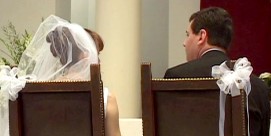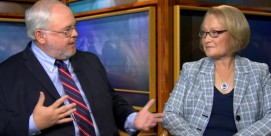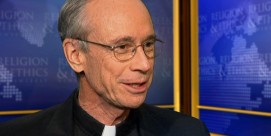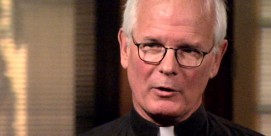PROF. SUSAN ROSS (Loyal University Chicago): The Church actually was very progressive in the Middle Ages by saying that for a valid marriage to take place, there had to be free consent of both the wife and the husband and there had to be a consummation of the marriage because marriage is a sacrament, it’s physical, it involves the body. And so there was the whole practice of posting the banns of marriage is to make it a public ceremony, that this is not something that’s secret, you don’t have marriage by capture, you don’t have any of that.
So the whole idea then is that two adult individuals can make a free consent, consummate that marriage and then that marriage is sacramental, it becomes representational of how Christ and the Church are related. So it became a sacrament relatively late in the Church’s history, about the 13th Century, because up until that time Catholics could marry, but it was generally considered a civic sort of practice.
From the biblical perspective Christ says, “What God has joined together let no one put asunder.” So that whole understanding of the permanent nature of marriage comes from that and it was really meant to be a kind of countercultural sort of position that in, with the Catholic tradition, this marriage is really a symbol of Christ’s relationship with the Church, which cannot be broken.
In order for a person to get remarried in the Church, that first marriage has to be declared null, that’s the annulment process. But that’s I think the rub in all of this situation. So there are kinds of situations in which an annulment might not be at all practical, you know. I know of someone, for example, who is married to a person who had a very brief, early marriage 40 years ago, never been in touch with the first wife, had a subsequent marriage, which was happy, wonderful, joyous, his wife died, he’s now married to a Catholic, he wasn’t even Catholic, but he’s now married to a Catholic, but since he was a baptized Christian and his first wife was a baptized Christian, technically they should receive an annulment. He doesn’t even know where she is, 40 years later, you know, what’s the point? So that’s one situation.
Another situation, and that by the way, that first situation might be one where an annulment might really be appropriate, but it’s really not practical. A second situation or a second question would be, can a valid marriage die? You know? Can you get to a point where there’s no love, there’s no community, there’s no grace bestowed by the partners on each other and the Church, and you know there are, it’s interesting that there are theologians, famous theologians 50 or 60 years, ago basically said, in cases where there’s no love, there’s actually hatred, there’s no community of life, the marriage still exists because the essence of marriage, the consummation and the consent, existed there to begin with.
So it’s a static, legal conception of marriage that means that no marriage can actually die. But I think that’s where the question really comes up. And my own parents divorced after 26 years of marriage. And my mother at the time felt an annulment would say that there was no marriage, but there was. And so I think in some situations, perhaps many situations, people would say there’s a kind of dishonesty in saying that there was no marriage.
These theologies were developed when people’s lifespans were probably half of what we have now. When women’s opportunities did not exist the way that they do now, when people’s lives changed geographically, emotionally, physically in all kinds of ways, and so there I think is a consideration. You know, is this theology of marriage that developed in a very positive way in the Middle Ages, is this appropriate for 2015?
The Church is experiencing people wanting, and this is what I think is important, people wanting to be a part of a worshipping community. And my sense would be at a time when Church attendance is declining, when there are more and more nones, N-O-N-E-S, and people want to be part of a worshipping community, part of the Church, my feeling would be welcome, you know, come in.
But here I think is the issue, is that the sacramental marriage, in the Church’s eyes, is still valid, so a second marriage without an annulment is not a valid marriage. It may be civilly, but it’s not sacramentally. And so it’s a legal obstacle that has, I mean there’s theological warrant for this, that the understanding of the Church is that when people commit to each other this is not, well, just until you know we get tired of each other or in case things don’t work out, this is a commitment, this is a lifelong commitment.
But this is where I think the Pope has been saying, can we have some pastoral considerations here for the times when this simply breaks down, it dies, there’s abuse, there’s dishonesty, injustice, all kinds of reasons. So the Church is in a sense caught between its own rock and its own hard place. You know, there’s this big focus on justice and mercy on the part of the Pope, especially mercy. Justice on the one hand requires that the canonical requirements for marriage be followed. Mercy on the other hand says wait a minute, these people want to be part of a worshipping community, they want to participate fully, what do you do? So I think you know that what the Pope is basically saying is let’s look at pastoral solutions to this. And in fact, many Church communities do this.
There’s this kind of culture of consent, as long as we want to say "Yes" to each other then great. But then once we say, "Well I don’t know, I don’t think this is working out anymore," and so it does, it kind of cheapens that relationship. So the Church’s challenge is to find a way to hold marriage as this sacred bond while recognizing the very human situation in which it falls apart.
I don’t think the basic theology is going to change. I don’t think the Church is gonna back off this understanding of marriage is a lifelong personal commitment that does not get broken easily. But what I hope will, what I myself hope will come out of this is guidelines for pastoral situations in which those who are in the situation of having remarried without an annulment, this is basically the people that we’re talking about, may seek a kind of pastoral solution. And this happens in the Orthodox Church, which allows for remarriage.
Now, what the Orthodox Church does is that there has to be a sense of sorrow, of repentance for the failure of that first marriage, that, it’s something to be sorry about. And whether it’s because one person or another, and the point is not so much to find fault in that first marriage, but there’s a kind of lament over the great hope and the joy that one might experience in the beginning of that that years later what, what do you see? It’s sadness, brokenness, you know, and having lived through my parents’ divorce I know it’s a kind of death, it’s something that you grieve. So the, there is sorrow for that.
But then the second part, which I think would be you know, more constructive, would be is the new marriage a real blessing, does it really, is it really a grace on the part of both partners? Because you know, in the Catholic theology of marriage, it’s kind of interesting, the couple confers the sacrament on each other. The priest is there, or the deacon, as a witness to the Church so kind of assigns everything in off, but in fact, the couple confer the sacrament on each other.
Baptism and marriage are the two sacraments that are actually potentially or actually performed by the people involved, because a lay person in case of emergency, can do a baptism. So in this case I think the real key is, is the second marriage or third or however one does it, is the second marriage genuinely a source of grace? Is this a blessing to each other and to the community and can they say that the first previous marriage was irretrievably broken?
And so my sense would be that this couple in this particular situation is genuinely wants to be part of a church community and genuinely wants their own marriage to be a blessing to that community. So if that’s possible and that would require some serious conversation with the pastor in this case, then it seems to me that that might be one avenue to allowing for how a divorced and remarried couple in that situation can return to the full reception of the sacraments and be a part of the Church community.







